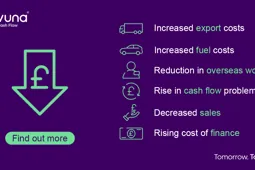Five tips to get your business more sustainable
Tuesday 22nd November 2022

Making your business more sustainable is a wise move as all businesses, including small ones, have a surprisingly large impact on the environment.
Sustainable businesses are growing and becoming environmentally friendly has many benefits - including an enhanced businesses reputation. Many consumers, shareholders and employees are prepared to only work or invest in eco-friendly and non-toxic products in an attempt to protect the future of the planet.
So, if you are thinking about how to make your business more sustainable but aren’t quite sure which are the best areas to tackle, we’ve come up with what we think are the top five ways to help your business become more sustainable in the future:
1. Product sourcing
Probably the first place to consider when making a business more sustainable is to look at where your products are sourced and to examine how sustainable your suppliers are:
- Do they practice ethical, social and environmental practices when producing the materials that your product is made from?
- Are they fair-trade and do they pay employees decent and liveable wages?
- Are their materials recyclable or made from recycled products, for example materials like cardboard and paper?
- Is it possible to source goods and services from local suppliers to cut down on transportation costs and to support the local community?
2. Go paperless
Reducing the amount of paper in the workplace can be a relatively simple objective to achieve:
- Try and reduce the amount you print. This can be made easier by integrating printers and scanners so that documents can be shared and stored digitally; this has the added benefit of saving time.
- Switch to online billing. This will dramatically cut down on paper waste as well as postage costs and storage space.
- Email receipts to customers instead of including paper ones inside packaged goods.
In spite of these changes, you are likely to find that paper is useful at times so to ensure you are staying on track make sure it is sustainably sourced, there are many of outlets that supply recycled paper, and once the paper is no longer needed make sure it goes to a reliable and trusted local source that will recycle it effectively.
3. Packaging/shipping and delivery
Packaging is a large contributor of waste in the world and single use plastics are particularly bad - especially when they aren’t recycled:
- Try to make sure that all packaging is biodegradable and that any single use plastics used in the company are made from materials that degrade quickly. Corn starch, mycelium, seaweed and leftover sheep wool can be used in many forms of packaging including envelopes and bubble wrap.
- If plastic is the only alternative, check it isn’t made up of 2 types of polymers as this can render it unrecyclable. Avoid the standard mailing packets lined with plastic bubbles, these are also difficult to recycle. Avoid packing anything that includes Styrofoam plus any plastic wrapping or cushioning.
- Look at how you deliver your goods. Keep your packaging as compact as possible to minimise your own costs but also the space taken up in the carriers hold. The more packages that can be carried in one journey, the fewer the emissions that will be produced over the long term so consolidate if you can by offering discounts for multiple orders.
4. Save energy
Look at how power is used in your business and find ways to reduce its costs:
- Activate the power management system on all computers to put them into a reduced power mode and shut down all electrical appliances not needed at night to reduce electricity costs.
- Introduce natural lighting where possible to reduce the need for artificial lighting by painting walls in bright colours and using mirrors to reflect light around the building. If natural light isn’t an option, then make sure you are using low energy light bulbs and in areas rarely used fit motion sensitive lights as these are perfect for saving energy.
5. Travel
- Encourage employees to cycle or walk to work if they can to reduce the number of cars and fuel emissions.
- Where possible give employees the option to work from home or remotely, as cutting down on pollution and fossil fuel usage will reduce your company’s overall carbon footprint, with the added benefit of improving your employee’s wellbeing. The pandemic introduced different ways of working for many of us and proved that working remotely didn’t necessarily mean a reduction in productivity. Working from home reduces the number of cars on the road plus less need for large office spaces with all their associated costs, including heating, electricity and supplies.
- Reduce unnecessary travel within the working day. The pandemic again showed us how many meetings can be successfully held online - reducing unnecessary journeys means less time is wasted and less energy and fuel is used.




